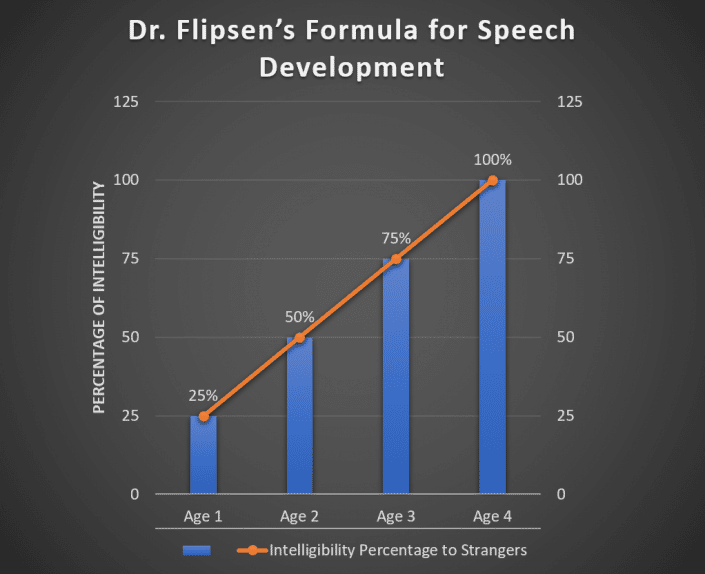What is Speech Intelligibility?
Communication is crucial for children in early developmental stages. However, when communication is interrupted, children can start to fall behind the developmental curve. Parents often worry about their child not being understood by others. Speech intelligibility is the clarity of one’s speech to others or how much of someone’s speech is understood. Higher degrees of speech intelligibility are easier to understand than lower degrees of intelligibility.
Is Your Child on Track?
Dr. Peter Flipsen Jr. is a renowned speech-language pathologist who has taught at schools all over the country. Dr. Flipsen devised an easy formula to show how speech clarity typically develops in children. Dr. Flipsen suggests dividing the age of the child by four. For example, if your child is 2, then you divide 2 by 4 and get .5 or 50%. This means that, on average, someone meeting a two-year-old for the first time should understand around 50% of what the child is saying. Typically, parents will be able to understand more of their own child’s speech since they are around their child more often and therefore are more familiar with their child’s speech patterns.

Factors That Affect Speech Intelligibility
Many factors impact how well a child is understood. The most notable of these factors is the production of speech sound errors. A speech sound error is when a child says a sound the wrong way. For example, a common error is replacing “th” with “f” and saying “fink” instead of “think”. The number, type, and consistency of speech sound errors can affect how easily someone can understand what a child is trying to say. It is important to remember that 100% clear speech/well-understood speech does not necessarily mean there are no speech sound errors since some sounds develop at later ages. A child producing speech sound errors can still be understood when the errors are consistent enough so that people know the child’s speech patterns.
Some other factors that can be affecting your child’s speech development are:
- Apraxia – when the brain has trouble sending the correct messages to the muscles of the mouth on how to move
- Dysarthria – the mouth muscles are weak and cannot make the correct sounds
- Developmental disorders and genetic syndromes – these are often noticed when a child is severely delayed in producing speech sounds and language
- Brain injuries – these can cause a child to stop any progress they’ve made or forget things they’ve already learned about speech and language
- Hearing loss – children experiencing hearing loss often have trouble developing higher frequency sounds such as “f”, “s”, and “th”. You may also notice a sudden decline in their speech intelligibility or an increase in speech sound errors.
Speech Therapy Can Help!
If your child does not meet Dr. Flipsen’s averages, they may benefit from skilled speech therapy services. Speech therapists can help to determine the source of the problem and then identify and correct the errors with interventions.
Speech therapists have exercises and activities they can utilize to help your child develop their speech skills, such as:
- Play-based tasks that focus on producing sounds correctly and work on the child’s volume and enunciation.
- Directed tasks at certain sound productions including visual models, descriptions, and assisting the child’s movement with touch. For example, if a child struggles to produce the sound “f”, a skilled speech therapist can verbally and physically cue them. A verbal cue would be a therapist saying “watch me, I’m putting my teeth on my bottom lip”. A physical cue would be holding cereal or a lollipop on the child’s lower lip to increase their awareness of touching the bottom lip.
- Moving from single sounds to syllables, short words, phrases, and then finally to conversation
If you’ve ever thought your child’s speech could use some help, then making an appointment with a speech-language pathologist could be a great option! A speech therapist can target your child’s speech sound errors unique patterns and slow their rate of speech as needed. Speech therapy can help to improve your child’s overall intelligibility and communication skills and open more doors for them as they grow!
Schedule an appointment at one of our 12 locations throughout the Greenville, Anderson, Spartanburg, Belton, Boiling Springs, Fort Mill, Powdersville, Seneca and Simpsonville, SC areas.


